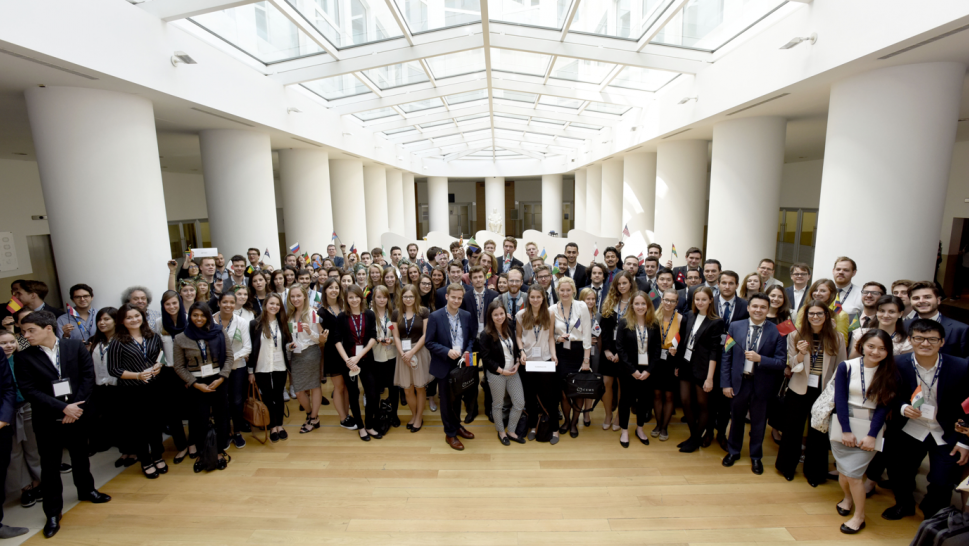This year’s Model UNFCCC, hosted by Bocconi University in Milan, Italy, co-incides with the official UNFCCC climate change conference taking place in Bonn, Germany from 8-18 May, meaning that this year’s simulation will be more high profile than ever.
During the two-day simulation, the 120 CEMS students from eight leading European business schools will take the roles of government, civil society and industry representatives from around the world. The annual Model UNFCCC, initiated in 2009 by the University of St. Gallen and ESADE in Barcelona, is now in its ninth edition. It consists of a semester-long course taught in parallel at all participating universities, followed by the final negotiations in which all students come together at rotating locations.
It represents a timely opportunity for CEMS Masters students to develop skills in dealing with one of the most urgent societal issues of our times, and to gain a deeper understanding of the role of business in coping with climate challenges and contributing to global solutions.
Inspired by the UN’s landmark Paris agreement adopted in 2015, the students’ task is to come up with ambitious strategies for implementing the global target of keeping climate change “well below 2 degrees”, a benchmark agreed upon in Paris but far from being implemented on a global scale. The students will also discuss issue like how to deal with climate refugees and how compliance to climate change agreements can be ensured by all countries.
Participating CEMS partner schools include: University of St Gallen (Switzerland), ESADE Barcelona (Spain), University of Cologne (Germany), Corvinus University of Budapest (Hungary), WU Vienna (Austria), Rotterdam School of Management (The Netherlands), Bocconi University (Italy) and the Warsaw School of Economics (Poland).
Ms Espinosa, Executive Secretary of the UNFCCC, said:
“Congratulations to the organizers from so many eminent academic institutions. In a world of dramatically evolving challenges, from climate change and the pollution of oceans to the loss of fertile soils and displaced people, the UN’s relevance is perhaps higher today than at any time in its history”.
“Yet there are also extraordinary examples of how the multilateral system can provide the solutions and the opportunities for a better, more secure and optimistic future—the Paris Agreement and the new Sustainable Development Goals are two examples of this and now we are striving to take theses outcomes forward at speed and scale with governments supported by progressive business, investors, cities, territories, regions, civil society and citizens” she added.
“Now and into the future we will need brilliant, creative and determined minds to be part of these UN processes—so I am delighted that so many talented, young people are part of the Model UNFCCC on shaping a post-Paris world. This will inspire them to engage in the crucial work of the UN on climate action on behalf of people everywhere,” said Ms Espinosa.
Academic Director of the Model UNFCCC, Prof. Rolf Wüstenhagen, commented:
“The CEMS ‘Model UNFCCC’ gives future business decision-makers from around the world, who will be strongly affected by these issues in their professional careers, an intense learning opportunity of what it means to solve a truly global challenge. We believe that young people should be educated on the key elements of climate change – science, evolving policy and the role of business – so that they can become an essential part of the solution.”
“This year’s simulation, to be held in Milan, will be more high profile than ever and is sure to be more heated due to turbulence around climate change on the international stage. Amidst a shifting geopolitical landscape, this year’s negotiations will mirror the challenges faced by real climate policymakers, but the creativity of CEMS students may also provide insights for new solutions that are driven by emerging markets increasingly taking the lead in the inevitable transition to a lowcarbon world.”
Roland Siegers, Executive Director of CEMS, added:
“Climate change is sure to have a huge impact on global business as well as wider society over the next few years; however this issue is not currently fully understood by decision makers. Current worldwide uncertainty around climate change policy and negotiations makes it even more crucial than ever for our business leaders of the future to fully understand all aspects of environmental negotiations around business and climate change policy.
“Our aim, through the model UNFCCC and corresponding climate change policy course, is to ensure that future leaders have a sound understanding of the interdependency of modern day business and climate change, so that they can lead successfully and thrive in these turbulent times.
“Through taking part in the simulation CEMS students go away with a greater passion and deeper knowledge of climate change policy, which sets them up for their working life. In the past, many of our students have gone into senior sustainability roles in multinational companies as a result of the course and simulation.”
More information can be found at www.modelunfccc.org
To attend the simulation or for more information or interviews, contact Prof. Dr. Rolf Wuestenhagen, rolf.wuestenhagen@unisg.ch +41 76 306 4313 The UN Framework Convention on Climate Change (UNFCCC) has under Article 6 of the Convention a mandate to promote education, access to information, training, public awareness and public participation as part of its Action for Climate Empowerment (ACE)
http://unfccc.int/cooperation_support/education_outreach/overview/items/8946.php




